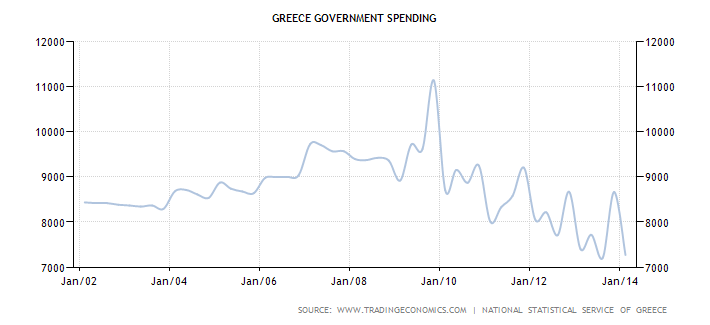Greek Government Worried About Its Survival
Antonis Samaras has a problem: just as the relatively tough austerity medicine Greece was forced to take seems to be beginning to bear some fruit (Greece is the one euro area country where nominal government spending has indeed declined significantly), his shaky coalition government may soon be stumbling over the country’s upcoming presidential election. The problem in a nutshell is that if Samaras fails to get his presidential candidate elected, new parliamentary elections would be triggered – and according to current polls, the coalition would lose against SYRIZA.

Greek government spending has declined significantly in nominal terms (though not as a percentage of GDP, as GDP has declined a lot) – click to enlarge.
SYRIZA as readers may recall, once was a smallish coalition of tiny left-wing parties to the left of the social democrats that didn’t really have a lot of electoral support. After the financial crisis and the bankruptcy of the Greek government, it quickly became the country’s largest party. SYRIZA is anti-bailout, whereby we are not quite sure what this stance actually entails. Presumably, a SYRIZA victory would mean a Greek exit from the euro, as Greece’s creditors would have to accept the country’s bankruptcy, and its banking system would lose the ECB’s support (since it would be instantly bankrupt, and hence no longer eligible to receive ECB funding). Moreover, tearing up the agreements with the “troika†would definitely lead to Greece being made into a pariah, so as to discourage others from following suit.
As Reuters reports:
“Four years after a messy descent into emergency funding to stave off bankruptcy, Greece’s government is trying to pull the plug on a deeply unpopular bailout program to secure its own survival.
Under growing pressure from anti-bailout leftists, Greek Prime Minister Antonis Samaras desperately needs a new narrative to get the backing of lawmakers in a crucial presidential vote next year and rally Greeks fed up with four years of austerity.
It is a gamble with high stakes for the Greek economy and Athens’ relations with its euro zone peers. Failure by Samaras to get his presidential nominee elected would trigger new polls that his anti-austerity rivals would almost certainly win.
[…]
Athens is calculating that declaring an end to the reviled bailout could be just the political game-changer it needs, with the end of bailout funding from the European Union in December offering a logical moment to seal the exit of the International Monetary Fund as well.
“It makes political sense, completely 100 percent,†a source familiar with the discussions said. “The IMF is not pushing to leave, the government is pushing for it.â€
Pulling this off, however, will almost certainly require Athens to notch up rapid-fire successes on several fronts – a swift end to its current bailout review, securing debt relief and the backing of European partners for going it alone.
In addition, forgoing over 12 billion euros in IMF loans and finding its own financing, just two years after a sovereign debt restructuring, remains a risky bet.
“If Greece completes this review with the blessing of the troika, who say ‘Great, you’ve done a lot’, maybe gets debt relief and a monetary agreement with the EU, then the markets may say ‘That’s good’ and it can raise 10 billion over the next year,†the source said.
“It’s a plausible financing scenario but there are risks for a country with emerging market access,†the source added, referring to Greece’s still low credit ratings.

